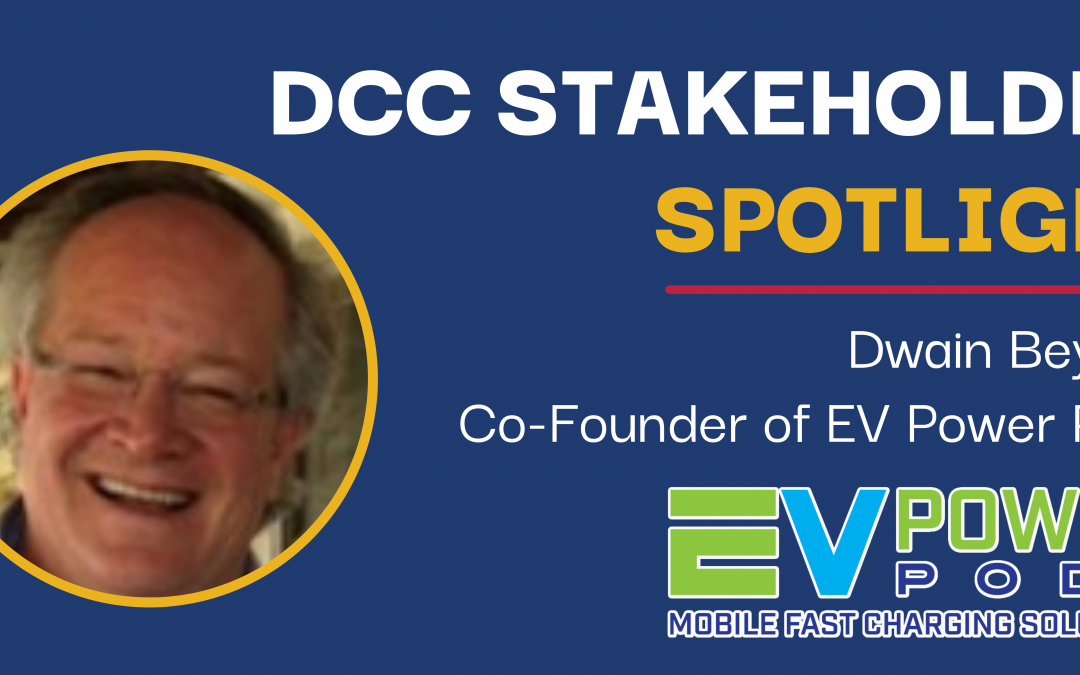Drive Clean Colorado (DCC) is happy to introduce EV Power Pods as one of our stakeholders. EV Power Pods provides mobile electric vehicle charging units that operate outside the energy grid while running on alternative fuels. EV Power Pods wants to fill in the charging infrastructure gap by providing deployable Direct Current (DC) fast charging units wherever it is needed. We spoke with Dwain Beydler, one of the founders of EV Power Pods about his experience with the company. Keep reading to learn more about EV Power Pods and how they can build EV charging resilience.

*Note: The following answers are summarized from an interview with Dwain Beydler from EV Power Pods
Could you introduce yourself and speak about your work at EV Power Pods?
My name is Dwain Beydler, and I’m one of the two principals of EV Power Pods. My counterpart is Barry Rowton, and he’s in charge of the engineering design side of the business. We created EV Power Pods about two years ago. We started the company because we recognized a dramatic lack of Direct Current (DC) fast charging infrastructure across the country. About 95% of the United States does not have the grid infrastructure to supply DC fast charging at the higher rates. So that’s where EV Power Pods come in. An EV Power Pod is a totally grid-independent, self-contained unit. We do not connect to the energy grid in any shape or form. The pods can run off propane or natural gas, and we prioritize using renewable propane and natural gas. EV Power Pods provide an alternative to power your vehicle, especially when you cannot access the grid.
What products and services do EV Power Pods offer that can help advance clean transportation in Colorado?
EV Power Pods come in two formats. First is the skid-mounted deployable format that integrates a DC fast charger and/or Level 2 chargers into a freestanding unit. We have 60 kW, 120-180 kW, and 250 kW models. All of our units come with dual-fuel capability. So, depending upon the unit’s location, you can power the unit with either propane or natural gas. Many potential clients are looking to use these units as an affordable deployment or a backup power source to increase their resilience. We also have a smaller unit, approximately the size of a parking space, that comes with four chargers that many small businesses are looking into.
Our second product line is the mobile unit, which we believe has tremendous resilience-building potential. The mobile unit is designed to be moved and starts out at 60 kW and can go to 180 kW. All our power pods meet the standard in the industry and can charge large school buses and Class 8 vehicles. The integrated control system of the unit is powered by a solar charging system. The mobile unit has been used in wildfire-prone areas out west and hurricane-prone areas in the southeast. These units can be placed anywhere along an interstate corridor to meet charging demand in an emergency.
You recently participated in the Charge Across America EV Rally. How was this experience, and what was EV Power Pods’ role in it?
The Charge Across America EV Rally was really exciting. The rally’s purpose was to demonstrate that you could drive from the east coast to the west coast accessing DC fast chargers the whole way. We traveled with the rally from the start in New York City, to Pittsburgh, up to Ann Arbor, down to Indianapolis, and across Missouri and Kansas to Colorado Springs. Unfortunately, we couldn’t travel with the race team all the way to Los Angeles, as we were needed elsewhere later that week. Our role was to support the charging of the EVs because the existing DC fast-charging network is very sparse. One broken DC fast charger along the route could spell trouble for the racers. The racers all had EVs that had a range of over 200 miles, but sometimes they were barely making it to the next charging station. This is why having a national DC fast-charging system every 50 to 60 miles along a highway is critical. Right now, it’s approximately 150 miles, which is pushing the limit of even some of the larger battery capacity cars. With our help, the race team made it from New York to Los Angeles without any charging issues! We were thrilled to be a part of this event. It really demonstrated the future of electric cars in a national context.
Are there any current projects you’re working on or events coming that you would like to share?
Things are winding down right now, but we hope to participate in the Major Truck Event in Indianapolis next spring!



